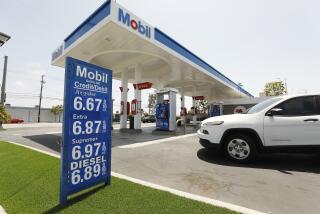Preventive Medicine
- Share via
When Alaska Gov. Steve Cowper came to California recently, he shared with state officials some of the lessons learned from the Exxon Valdez oil spill. Most importantly, Cowper said, a strong authority must take charge of containment and cleanup from the minute the oil hits the water. Secondly, a pool of money must be on hand so that work is not delayed while various parties quibble about who is going to pay. And, Cowper added, the responsible governments involved must tighten up on ship-traffic control to avoid the sort of disaster that occurred in Alaska.
All those points would be directly addressed in a comprehensive oil-spill prevention and response plan being proposed by two members of the State Lands Commission, state Controller Gray Davis and Lt. Gov. Leo T. McCarthy. The plan probably will not be introduced in the Legislature in bill form until January, but legislative leaders and the Deukmejian Administration should begin to take a careful look at the outline immediately. Of all the coastal areas that should fear the effects of a massive oil spill, California has the most to protect.
Congress currently is debating oil-spill liability legislation. Actually, Congress has been doing that since the 1970s, but the big hang-up has been a dispute between the House and the Senate over preemption of state liability plans. The Davis-McCarthy plan has a strong liability feature, but Davis is correct in saying that it would be no major loss if adequate federal legislation preempted state action. That would not affect the rest of the program, and, most importantly, the state’s ability to react quickly in the event of a ship collision, oil platform blowout or pipeline rupture.
The plan would be financed through the assessment of a fee on each barrel of crude oil transported through California marine terminals. The size of the fee has not been determined yet, but the goal is to maintain a fund of $500 million. Some of the money would be used to finance preventive measures such as an improved tanker-traffic program and the establishment of emergency oil-spill centers in the California North Coast, San Francisco Bay area, the Central Coast and Southern California. Oil companies now maintain three such centers, but experts have testified that they are not equipped to handle a large spill. Also, Davis has suggested that the Coast Guard be in charge of all oil-spill operations from the outset.
Following the Exxon Valdez accident, the oil industry announced plans for a $250-million program with similar goals--to reduce the chance of tanker accidents and to provide a quick response. Equipment would be put on the ready at five major U.S. ports to control a 200,000-barrel spill within five hours.
And Secretary of the Interior Manuel Lujan Jr. has said he will look into the creation of offshore tanker super ports along the coastline to reduce the danger of ship collisions and rammings going to and from port. There is such a super port now, 18 miles off the Louisiana coast in the Gulf of Mexico. But an article in The Times by staff writer Patrick Lee indicates the impracticality of that idea, at least in the short run, for California.
The effort of the 14 oil companies is welcome. And there is nothing wrong with studying the super-port idea, but California must not count on such efforts for its front-line defense of the coast. Nor need the Legislature wait until the Davis-McCarthy plan is in specific bill form. The appropriate committees could begin hearings now on the concept. Until strong action is taken, California stands just as naked and vulnerable as was Alaska to the sort of accident no one thought would happen.
More to Read
Sign up for Essential California
The most important California stories and recommendations in your inbox every morning.
You may occasionally receive promotional content from the Los Angeles Times.










